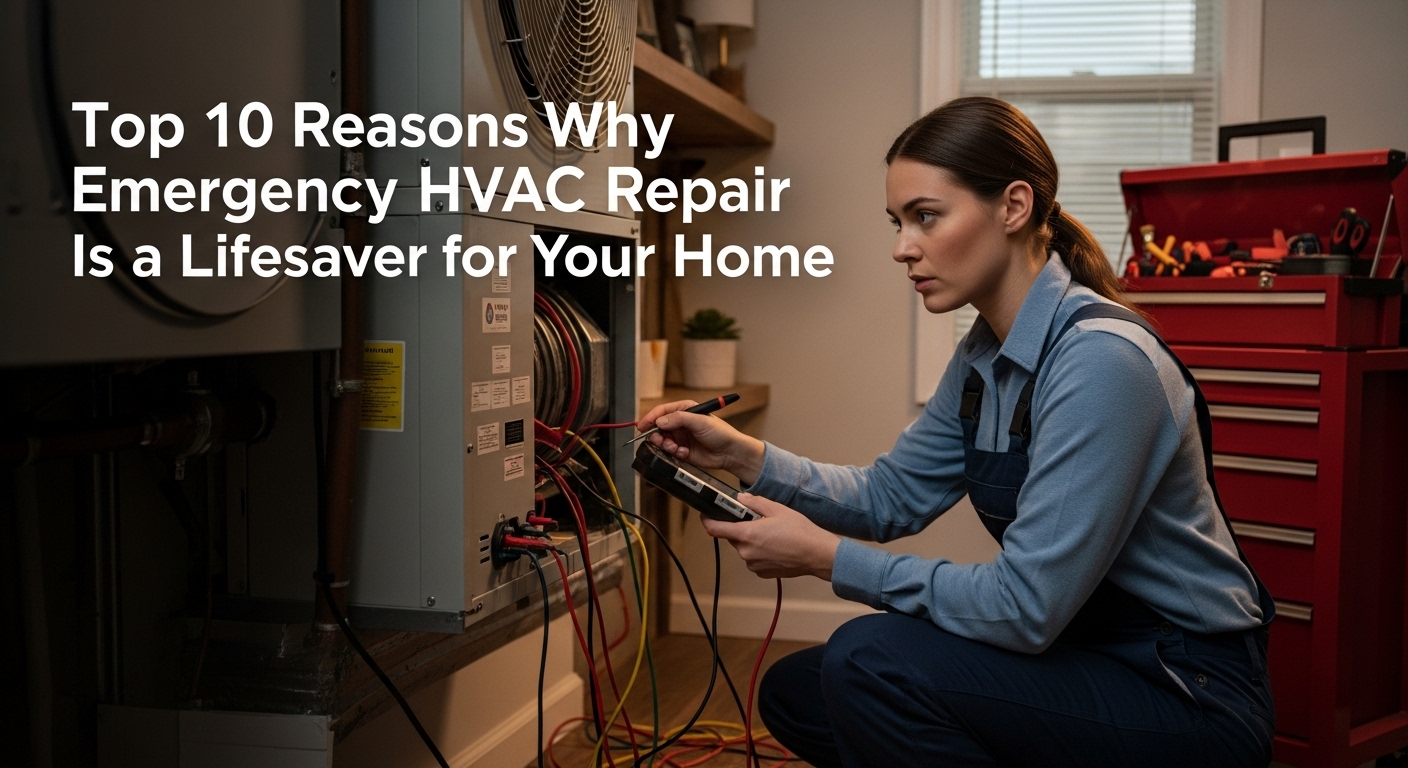Understanding Emergency HVAC Repair
When your heating or cooling system fails in the middle of a freezing winter night or during a summer heatwave, emergency HVAC repair becomes your saving grace. Unlike standard maintenance, this service is designed to address sudden, critical failures that affect your safety and comfort.
What Is Emergency HVAC Repair?
Emergency HVAC repair involves urgent, round-the-clock services to fix malfunctioning air conditioning, ventilation, or heating systems. These repairs prevent property damage, ensure comfort, and restore your indoor air quality quickly.
When Do You Need Emergency HVAC Services?
You need emergency HVAC help when:
- Your system completely shuts down.
- There’s a burning smell, smoke, or strange noises.
- The temperature inside your home becomes unbearable.
- Leaks or electrical sparks appear.
Common HVAC Emergencies Homeowners Face
Some common scenarios include refrigerant leaks, frozen evaporator coils, thermostat malfunctions, or electrical issues that can cause short circuits. Each of these problems requires prompt attention to prevent system breakdown.
Top Signs You Need Emergency HVAC Repair
1. Sudden System Failure During Extreme Weather
When your HVAC system stops working amid freezing cold or blazing heat, immediate repair is crucial to avoid health risks and discomfort.
2. Strange Noises or Burning Smells
Rattling, banging, or electrical burning odors signal mechanical failure or wiring issues that could lead to fire hazards.
3. Poor Airflow or Complete Lack of Cooling/Heating
If your system struggles to maintain airflow or temperature, it may indicate clogged filters, blower motor issues, or refrigerant leaks.
4. Unusual Spikes in Energy Bills
A sudden rise in electricity usage often signals an overworking HVAC system, needing prompt professional inspection.
Benefits of Calling for Emergency HVAC Repair
Protecting Your Family’s Comfort and Safety
Fast HVAC service ensures your family remains warm or cool, especially during extreme weather conditions that can pose health risks.
Preventing Further Damage and Costly Replacements
Timely intervention often prevents minor issues from escalating into expensive replacements.
Saving Money Through Early Detection
Emergency HVAC repair technicians often identify underlying issues, saving you money in the long run.
Peace of Mind from 24/7 Availability
Knowing experts are available day or night gives you confidence that comfort is only one call away.
Common HVAC Problems Requiring Immediate Attention
| Problem | Description | Potential Risk |
|---|---|---|
| Refrigerant Leaks | Loss of cooling power | Compressor damage |
| Frozen Coils | Caused by low airflow or refrigerant | System freeze-up |
| Electrical Failures | Short circuits or faulty wiring | Fire hazards |
| Thermostat Malfunctions | Incorrect readings | Inefficient cooling |
How Emergency HVAC Technicians Respond Quickly
Diagnostic Procedures and On-Site Inspection
Technicians arrive equipped with diagnostic tools to identify problems within minutes.
Temporary Fixes vs. Long-Term Solutions
They often provide immediate relief (like restoring airflow) while planning comprehensive repairs.
Safety Protocols in Emergency HVAC Services
Professionals adhere to strict safety guidelines, ensuring no risk to homeowners during repairs.
Average Cost of Emergency HVAC Repair
The price of emergency HVAC repair varies between $150 and $1,200, depending on the issue’s severity, time, and system type.
Factors Affecting Pricing
- Time of service (after-hours or holidays cost more)
- Type of damage (electrical, mechanical, or refrigerant)
- Location and accessibility of the unit
Cost Comparison
Regular repairs may range from $75–$500, while emergency services can double due to urgent response times.
Saving on Urgent Repairs
Signing a maintenance contract with an HVAC provider can reduce emergency costs and ensure priority service.
Choosing the Right Emergency HVAC Service Provider
What to Look for in a 24/7 HVAC Company
Opt for licensed, bonded, and insured companies that offer clear pricing and quick dispatch.
Certifications and Licenses
Certified technicians from organizations like NATE (North American Technician Excellence) ensure quality service.
Customer Reviews and Service Guarantees
Always check online reviews or testimonials for reliability and transparency.
Preventing Future HVAC Emergencies
Importance of Routine Maintenance
Regular servicing every 6 months keeps your system running efficiently.
DIY HVAC Care Tips
- Replace filters every 2-3 months.
- Keep vents unobstructed.
- Clean condenser coils regularly.
Scheduling Seasonal Inspections
An HVAC tune-up before summer and winter can prevent sudden breakdowns.
Safety Tips During an HVAC Emergency
Shutting Down the System Safely
Always turn off the system immediately if you smell burning or see smoke.
Avoid DIY Electrical Fixes
Never attempt electrical or refrigerant repairs yourself — it’s both dangerous and illegal without certification.
When to Evacuate
If gas leaks or electrical sparks occur, evacuate and call emergency services first.
FAQs About Emergency HVAC Repair
Q1. How fast can emergency HVAC services arrive?
Most reputable companies respond within 1–2 hours, depending on your location.
Q2. Is emergency HVAC repair more expensive?
Yes, due to the immediate response and after-hours service, it usually costs more than standard repairs.
Q3. What should I do while waiting for a technician?
Turn off your system, ensure proper ventilation, and avoid tampering with any components.
Q4. Can emergency HVAC repair fix all systems?
Most modern and older systems can be serviced, though some outdated units may need replacement.
Q5. How can I prevent future emergencies?
Regular maintenance, timely filter changes, and professional inspections reduce emergency risks.
Q6. Are emergency services available 24/7, including holidays?
Yes, most providers offer round-the-clock support, even on weekends and holidays.
Conclusion: Don’t Wait—Act Fast During HVAC Emergencies
When your HVAC system fails unexpectedly, acting fast can protect your health, safety, and comfort. Emergency HVAC repair ensures your system is restored quickly, minimizing damage and preventing costly replacements. Regular maintenance and choosing a trusted service provider are your best defenses against future emergencies.
External Resource: Learn more about HVAC maintenance at Energy.gov

